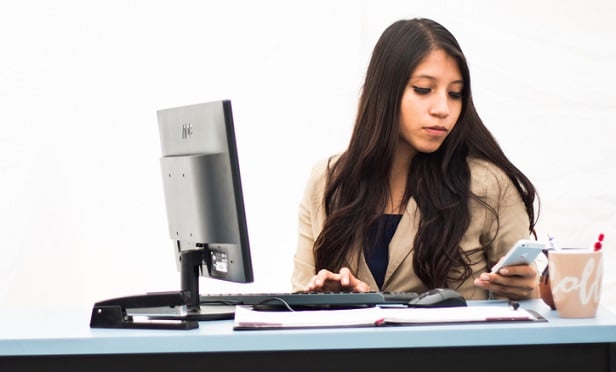 The app'srapid growth underscores risks for regulators and concerns amonghealth professionals as they grapple with the rapidly emergingmarket for mobile and digital health applications. (Photo:Shutterstock)
The app'srapid growth underscores risks for regulators and concerns amonghealth professionals as they grapple with the rapidly emergingmarket for mobile and digital health applications. (Photo:Shutterstock)
London (AP) — The condom, the pill and now, the smartphone?
|Natural Cycles, a mobile fertility app, this month became thefirst ever digital contraceptive device to win FDA marketingapproval. Women take their temperatures and track their menstrualcycle on the app, which uses an algorithm to determine when they'refertile and should abstain from unprotected sex or use protection. In effect, it's a form of therhythm or calendar method.
|The Swedish startup says it's effective and lets women avoidside effects common with other methods like birth control pills. But reports of unwantedpregnancies and investigations by authorities in two countries inEurope, where it received EU certification in 2017, have raisedquestions about marketing what is essentially a health monitor as acontraceptive.
|Related: Trump rule limits Obamacare's birth controlcoverage requirement
|Natural Cycles boasts more than 900,000 users, and such fastgrowth underscores risks for regulators and concerns among healthprofessionals as they grapple with the rapidly emerging market formobile and digital health applications.
|“Apps are incredibly popular and there's nothing inherentlywrong about using tech to support our health,” said Bekki Burbidge,deputy chief executive of the Family Planning Association, aBritish sexual health organization. “But they're also an area thatis fairly unregulated and it can be hard to sort the good,evidence- and research-based apps from the bad.”
|The app is similar to hundreds of other period trackers alreadyavailable, most of which are aimed at helping women conceive. ButFDA approval means it can be marketed as a mobile contraceptive,giving it an edge in the mobile medical apps market, which isforecast to grow to $11.2 billion by 2025, up from at $1.4 billionin 2016, according to BIS Research. The makers of Natural Cyclesacknowledge it's not 100 percent effective and some women mightstill get pregnant even if used perfectly.
|The Food and Drug Administration regulates apps and gadgets thatcollect or track medical information as medical devices, though itdoesn't scrutinize many more that merely perform simple tasks liketracking calories.
|Marketing of contraceptive apps needs to be extremely careful toensure that women understand exactly what they're signing up forand the limitations, the Faculty of Sexual and ReproductiveHealthcare of the Royal College of Obstetricians and Gynecologistssaid in a statement.
|The FDA gave its approval based on data from Natural Cyclesinvolving 15,570 women who used the app for an average of eightmonths. The FDA said that if the app is used correctly all thetime, 1.8 percent of women would get pregnant over one year. The“typical use” failure rate, which factors in human error,was 6.5 percent.
|The birth control pill's failure rate is 9 percent, while forcondoms it's 18 percent and 24 percent for fertility-awarenessmethods , but those figures are backed up by much more long-termdata.
|The company's founders, Elina Berglund and Raoul Scherwitzl, area married couple who are both former physicists. Berglund was partof a team of scientists looking for the Higgs boson particle at theEuropean Organization for Nuclear Research, or CERN, inSwitzerland. They pivoted from science to startups when they wrotethe algorithm to help them have a baby and then developed an app totap broader demand.
|The app is free to download but the company charges $10 a monthto use it. Its claims were called into question in January, afterSwedish regulators started investigating reports that 37 women whoused it became pregnant anyway.
|The Swedish Medical Product Agency said it's looking intowhether the number of unwanted pregnancies falls within the app'sclaimed effectiveness rate, and the investigation is expected towrap up in September.
|Natural Cycles said that as a condition of EU certification, itmust continue monitoring user data, which it says show that thetypical-use effectiveness rate remains at 93 percent.
|“We care deeply each and every time one of our users becomespregnant,” the company said in a statement. “One of the ongoingchallenges with all forms of contraception is that there is alwaysa statistical chance of unintended pregnancy, since no method is100 percent effective.”
|FDA spokeswoman Deborah Kotz said the agency was aware of theSwedish reports but felt they were consistent with its knowledge ofrisks associated with the app.
|“An increase in the absolute numbers of unintended pregnanciesis expected with a growing number of users,” she said.
|Britain's Advertising Standards Authority, meanwhile, says it'slooking into whether paid-for Facebook posts that claim NaturalCycles is a “highly accurate contraceptive app” and “clinicallytested alternative to birth control methods” are misleading.
|“We have launched a formal investigation and will publish ourfindings in due course,” the authority said.
|Burbidge said more outside research into fertility apps isneeded because “at the moment there's not enough independentevidence” on their reliability. She added that women using suchapps need to be motivated and aware of factors that can make itless effective, such as travel, alcohol, stress or not gettingenough sleep, which can all affect temperature readings.
|“There's so much you can do that makes it not perfect,” shesaid.
Complete your profile to continue reading and get FREE access to BenefitsPRO, part of your ALM digital membership.
Your access to unlimited BenefitsPRO content isn’t changing.
Once you are an ALM digital member, you’ll receive:
- Critical BenefitsPRO information including cutting edge post-reform success strategies, access to educational webcasts and videos, resources from industry leaders, and informative Newsletters.
- Exclusive discounts on ALM, BenefitsPRO magazine and BenefitsPRO.com events
- Access to other award-winning ALM websites including ThinkAdvisor.com and Law.com
Already have an account? Sign In
© 2024 ALM Global, LLC, All Rights Reserved. Request academic re-use from www.copyright.com. All other uses, submit a request to [email protected]. For more information visit Asset & Logo Licensing.








